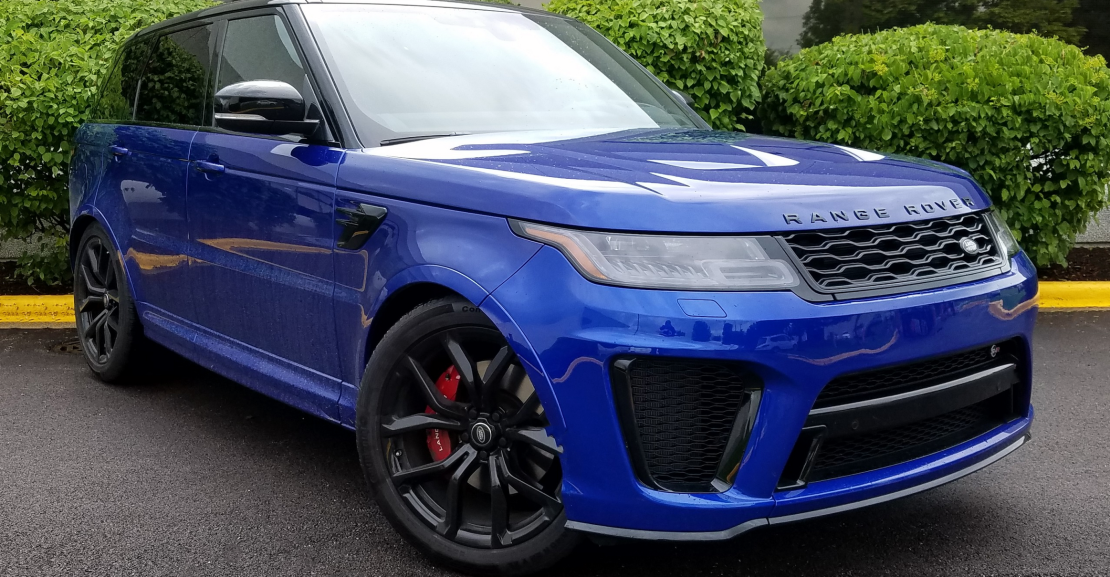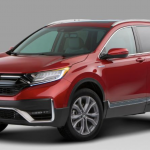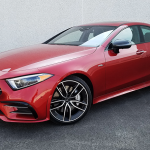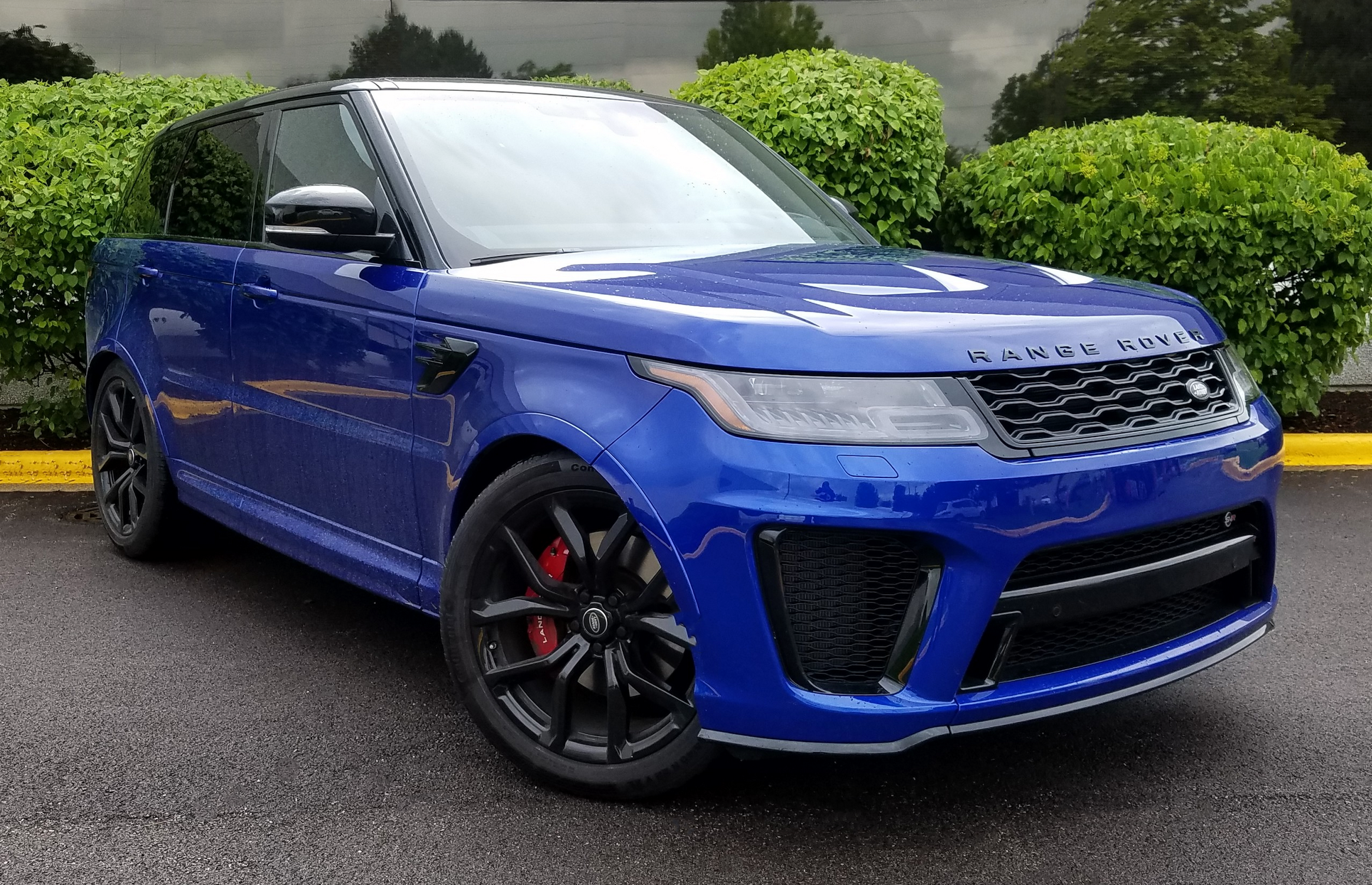
 2019 Land Rover Range Rover Sport SVR
2019 Land Rover Range Rover Sport SVR
Class: Premium Midsize Crossover
Miles driven: 299
Fuel used: 21.8 gallons
| CG Report Card | |
|---|---|
| Room and Comfort | B+ |
| Power and Performance | A+ |
| Fit and Finish | A+ |
| Fuel Economy | D |
| Value | C- |
| Report-card grades are derived from a consensus of test-driver evaluations. All grades are versus other vehicles in the same class. Value grade is for specific trim level evaluated, and may not reflect Consumer Guide's impressions of the entire model lineup. | |
| Big & Tall Comfort | |
| Big Guy | B- |
| Tall Guy | A |
| Big & Tall comfort ratings are for front seats only. "Big" rating based on male tester weighing approximately 350 pounds, "Tall" rating based on 6'6"-tall male tester. | |
| Drivetrain | |
| Engine Specs | 575-hp 5.0-liter |
| Engine Type | Supercharged V8 |
| Transmission | 8-speed automatic |
| Drive Wheels | AWD |
Real-world fuel economy: 13.7 mpg
Driving mix: 65% city, 35% highway
EPA-estimated fuel economy: 15/20/16 (city/highway/combined)
Fuel type: Premium Gas
Base price: $114,500 (not including $1295 destination charge)
Options on test vehicle: Driver Assist Pack ($3185), Meridian premium audio system ($4540), 22-inch Style 5083 wheels w/ gloss-black finish ($3060), Estoril Blue paint ($1525), head-up display ($1325), Soft Door Close ($610), Activity Key ($410), Extended Grand Black Veneer ($410), Ebony Morzine Interior ($355), heated and cooled front and heated rear seats ($305), summer tires (no cost), black roof (no cost), Smartphone Pack (no cost)
Price as tested: $131,520
Quick Hits
The great: Ferocious performance; high-class interior
The good: Despite the focus on street performance, there’s still Land Rover-style all-terrain capability
The not so good: High price; fuel economy; somewhat stiff ride
More Range Rover Sport price and availability information
John Biel
Among Range Rovers the Sport may be the junior partner, but it is an ambitious one. That is especially clear in the high-performance—and high-dollar—SVR version.
The point is raised with 5.0 liters of supercharged V8 and a sport suspension. It is hammered home with a starting price of $115,795 including delivery.
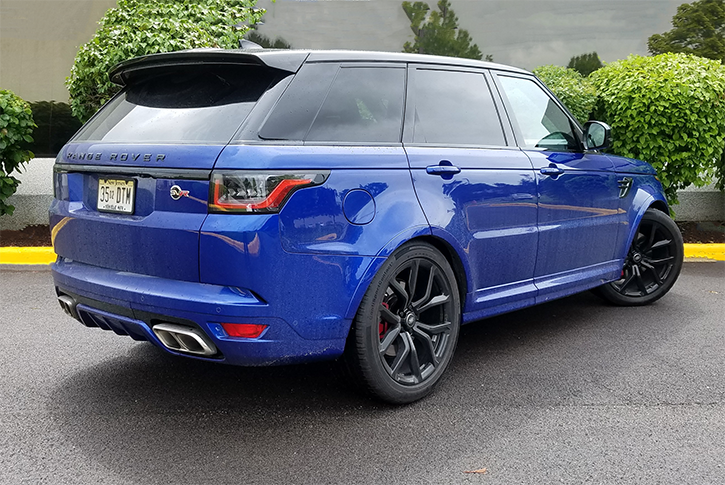
The SVR pumps out muscular acceleration with an exhaust note that will not let you forget what’s under the hood. Its blown V8 is rated at 575 horsepower and 516 lb-ft of torque, and will launch the roughly 5100-pound premium midsize crossover SUV from 0 to 60 mph in 4.3 seconds, per the manufacturer, which also claims it is the fastest Land Rover vehicle ever made. A two-stage active exhaust with electronically controlled valves emotes in a purposeful grumble that exits through a quartet of distinct integrated finishers.
Test Drive: 2019 Land Rover Range Rover Sport Plug-in Hybrid
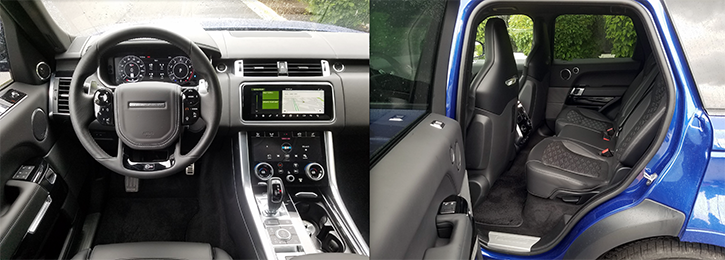
Response to the throttle is immediate and, with the aid of the excellent 8-speed automatic transmission, there is no lack of merging or passing power at the ready. That is unless the things you’re trying to pass are filling stations. EPA estimates for SVR fuel economy are 15 mpg in city driving, 20 mpg on the highway, and 16 combined—not absolutely terrible considering the weight and power of the thing. Still, this driver didn’t do quite that well, logging 14.36 premium-fed mpg after a trip of 155.3 miles that was two-thirds city-style driving.
All Range Rover Sports employ a quiet, secure aluminum body structure. The SVR goes a step beyond with a carbon-fiber hood sporting integrated air vents. When the going gets rapid, large intakes in the bumper direct additional airflow around the powertrain and brakes. Performance-enhancing chassis features include a sport-tuned adaptive air suspension and an active differential that provides braking-induced torque vectoring. While this racy Rover handles fairly nimbly for its size, ride is firm and not always forgiving of surface imperfections, especially on the test truck’s optional 22-inch wheels (21-inchers are standard). The SVR brakes with quick, strong effect.
Test Drive: 2019 Acura MDX Sport Hybrid
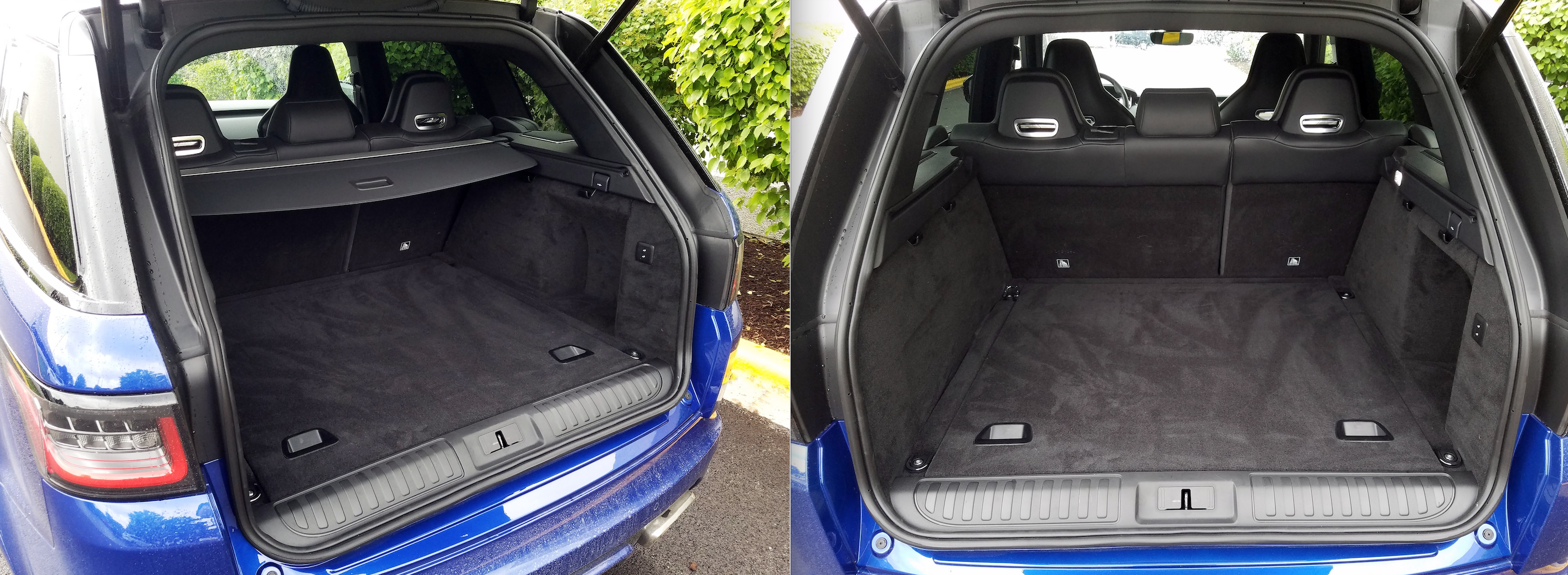
This being a Range Rover, there’s still a serious SUV lurking within. Among the standard equipment is the Terrain Response 2 System, which can automatically tailor performance of the full-time 4-wheel drive to different surface settings, or allow the driver to individually select a mode. There’s also a 2-speed transfer case; hill-descent control; and All Terrain Progress Control, a low-speed “cruise control” that maintains a consistent pace over rough terrain.
Finally, lest anyone forget, this also is a luxury vehicle. Front seats are grippy, high-back sport seats, but seats in both rows are clad in a rich premium Windsor leather and heated. (Some Range Rover Sport models are available with optional third-row seats that even the manufacturer concedes are truly suited to kids, but the SVR isn’t one of them.) Leather also swaddles the heated power-adjusted steering wheel with shift paddles. Overhead looms a panoramic sunroof. Convenience items include LED headlights with automatic high-beam assist, hands-free tailgate, power-folding heated external mirrors with memory function and approach lights, 3-zone climate control, configurable ambient interior lighting, Apple CarPlay/Android Auto smartphone connectivity, surround-view camera, and keyless entry and starting. Built-in safety minders consist of lane-departure warning, rear cross-traffic alert, blind-spot monitor, and driver-condition monitor.
Test Drive: 2019 BMW X5 xDrive40i
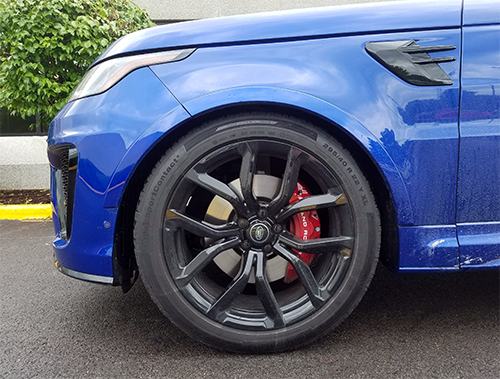
Frankly, it ought to be impossible to forget the Sport SVR is a luxury vehicle when the final price hits $131,520, as on CG’s tester. It was augmented with things like a 1700-watt Meridian sound system (in place of the base 875-watt unit); head-up instrument display; Jaguar-Land Rover’s wristband “Activity Key;” and Driver Assist Package with adaptive cruise control, high-speed emergency braking, and three other features.
The two screens of “Touch Pro Duo” serve as the control centers for audio, communications, navigation, and climate. The lower climate screen does use two external dials to set temperatures and fan speed, but switching out from temperature to fan requires more steps than a dedicated fan-speed knob would ask of a user. The process for saving audio presets is easily understandable—but the fact that it’s a process makes it just one more Euro brand that equates complexity with quality.
Four adults can squeeze in fairly comfortably—though rear passengers likely will suffer if those in front need extra room—and there is marginally comfortable space for a middle passenger in back. Doors open wide, facilitating entries and exits, but step-in is a little high for shorter or less-limber folks. Windows are large and roof pillars are fairly thin, which aid driver vision. Personal-item storage, not one of the Sport’s strengths in general, takes a further hit in the SVR because there are no pouches on the backs of the special sport seats. Up front are dual glove boxes, a modest console box with device inputs inside, twin covered cup holders, and large door pockets. Rear occupants get smaller door pockets and a shallow covered compartment with a small net pouch and two cup holders in the pull-down center armrest.
The rear cargo area features a big, flat floor. Liftover isn’t excessive. The rear seats fold in a 60/40-split for additional hauling capacity. However, they don’t retract especially flat, and a gap exists between the forward edge of the cargo floor and the folded seats.
The blending of luxury with capability have come to exemplify Land Rover and Range Rover products. So too, unfortunately, has high cost. These things are never cheap, even in the context of upscale market rivals. If the Range Rover Sport SVR has one thing that might make it remotely worth its lofty price, it’s a level of performance that is tough for many of its competitors to match.
Test Drive: 2019 Maserati Levante GTS
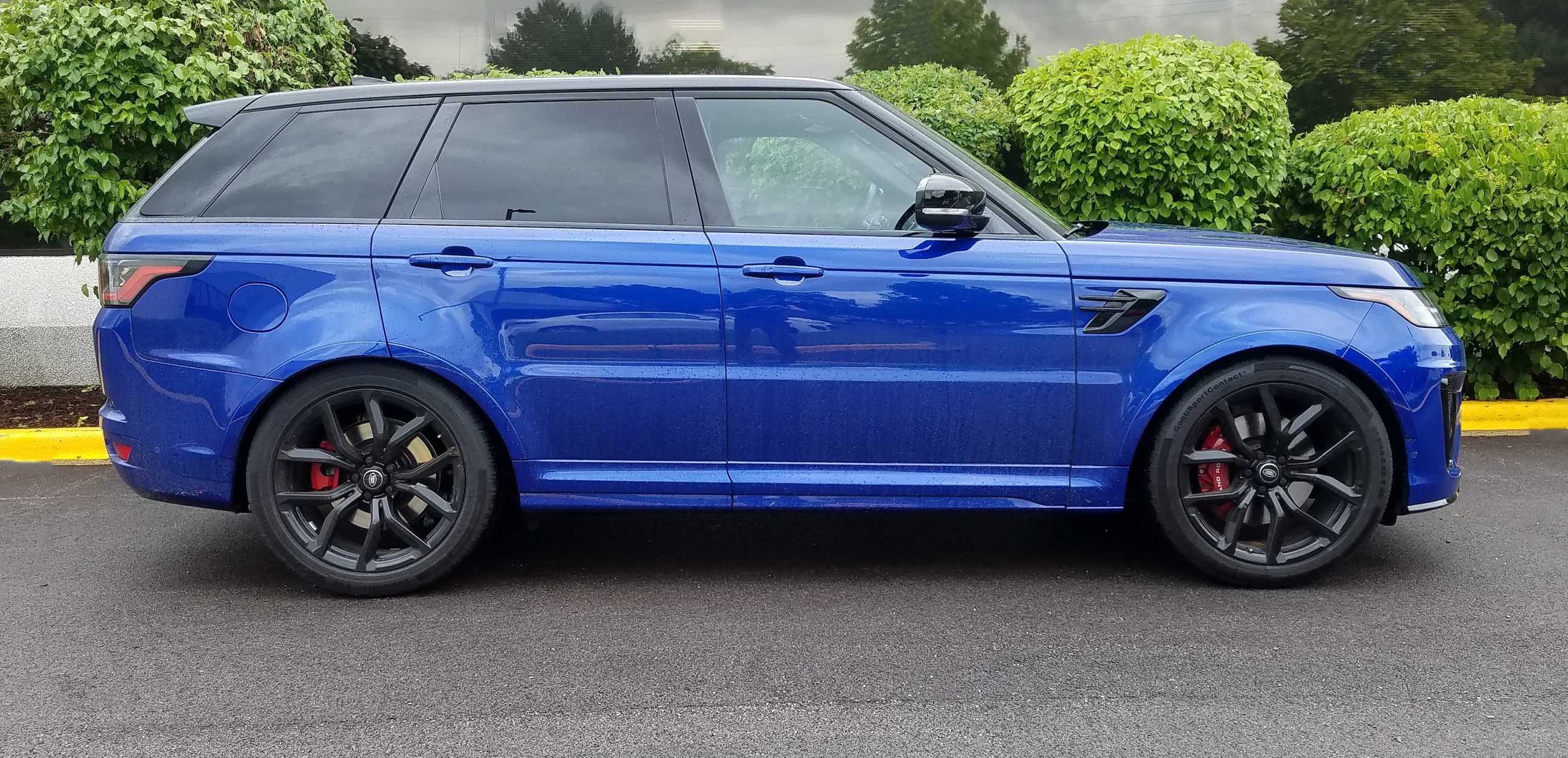
Range Rover Sport SVR

